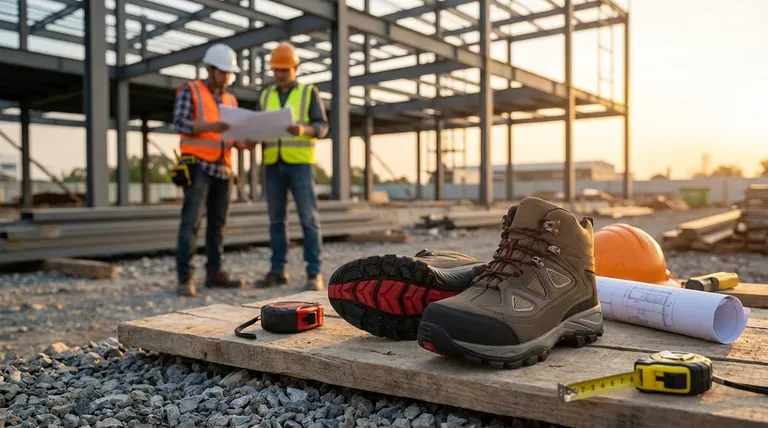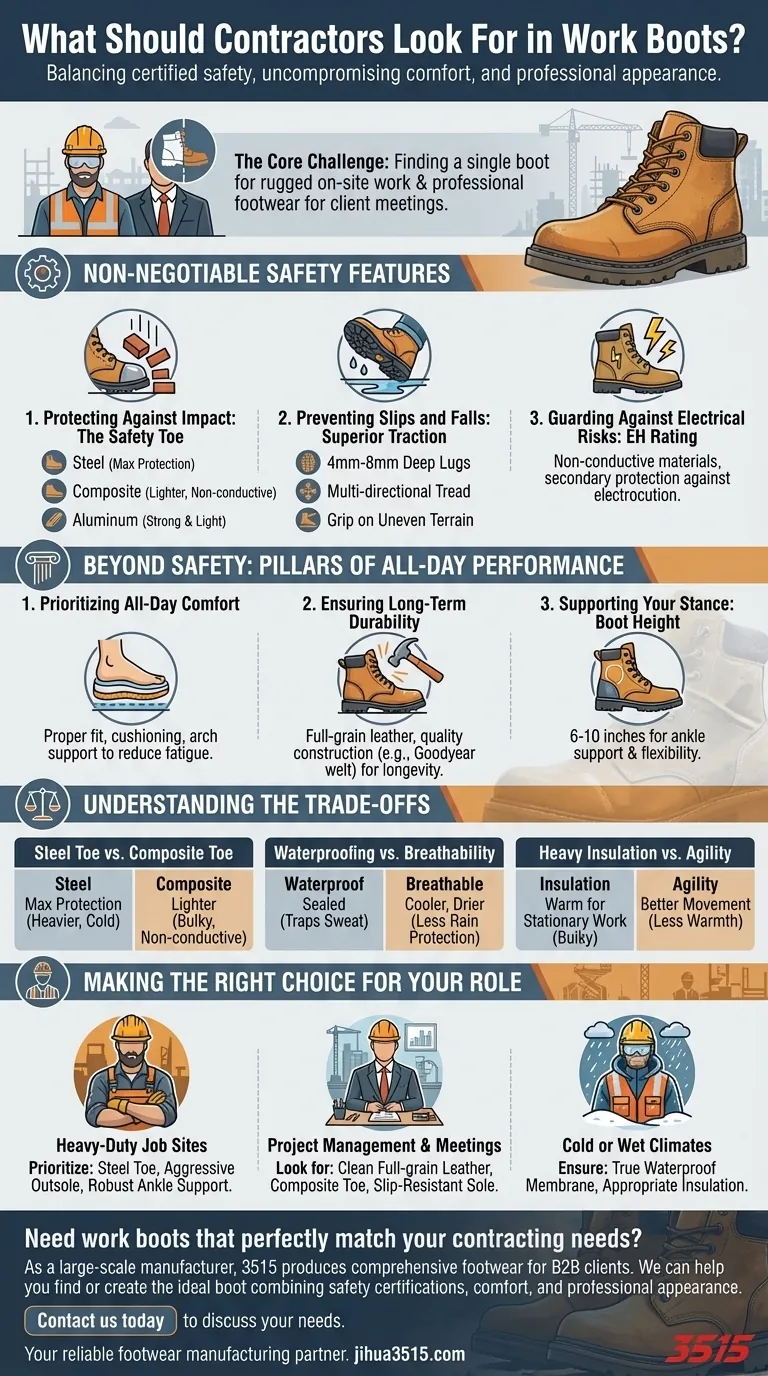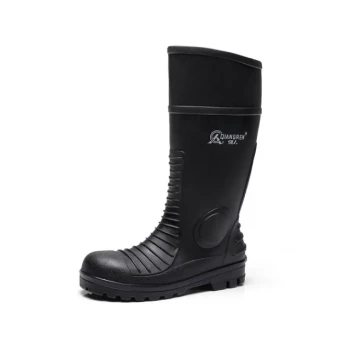Choosing the right work boot is about securing a tool as critical as any in your truck. For a contractor, the best boot is a balanced blend of certified safety features for the job site, uncompromising comfort for long days, and the durable, professional appearance required when meeting with clients.
The core challenge for a contractor is finding a single boot that serves two distinct roles: the rugged, protective gear for on-site work and the professional, presentable footwear for business management. The right choice isn't about finding the toughest boot, but the most versatile one.

The Foundation: Non-Negotiable Safety Features
Before considering comfort or style, a boot must meet the fundamental safety requirements of your work environment. These features are your first line of defense against common job site hazards.
Protecting Against Impact: The Safety Toe
A protective toe cap is the most essential safety feature. It shields your feet from falling objects and compression.
You have three main options: steel, aluminum, and composite. Steel offers maximum protection but is the heaviest. Composite toes are lighter, don't conduct cold, and won't set off metal detectors, but can be bulkier.
Preventing Slips and Falls: Superior Traction
The outsole of your boot is what keeps you upright. Look for deep lugs, between 4mm and 8mm, and a multi-directional tread pattern.
This design ensures a firm grip on uneven terrain, wet surfaces, and ladders, significantly reducing the risk of slips and falls.
Guarding Against Electrical Risks: EH Rating
If you work anywhere near potential live electrical circuits, an Electrical Hazard (EH) rated boot is crucial.
These boots are constructed with non-conductive materials to provide a secondary source of protection against accidental electrocution.
Beyond Safety: The Pillars of All-Day Performance
Once safety is addressed, focus shifts to features that allow you to perform your job effectively and without distraction from dawn until dusk.
Prioritizing All-Day Comfort
Comfort is not a luxury; it's a functional necessity. You will spend countless hours in these boots, making proper fit, cushioning, and arch support paramount.
A boot that causes pain or fatigue is a distraction and a safety risk in itself. Never compromise on a comfortable fit.
Ensuring Long-Term Durability
A contractor's boot must withstand constant abuse. Full-grain leather remains a top choice for its resilience, water resistance, and ability to mold to your foot over time.
Quality construction, such as Goodyear welt or stitch-down methods, indicates a boot built for longevity, not just a single season.
Supporting Your Stance: Boot Height
Look for a boot height between 6 and 10 inches. This range provides a critical balance of ankle support and flexibility.
Taller boots offer more protection and stability on uneven ground, which is essential for preventing twists and sprains.
Understanding the Trade-offs
Choosing the perfect boot involves balancing competing features. Understanding these compromises is key to making an informed decision.
Steel Toe vs. Composite Toe
A steel toe offers the highest level of impact protection but adds weight and can become extremely cold in winter weather. A composite toe is lighter and better for cold climates but is often bulkier to achieve the same safety rating.
Waterproofing vs. Breathability
A truly waterproof boot with a sealed membrane is excellent for wet conditions but can trap sweat, leading to discomfort. A more breathable boot will keep your feet cooler and drier from the inside but may not withstand a downpour.
Heavy Insulation vs. Agility
Heavily insulated boots are essential for stationary work in cold weather. However, that insulation adds bulk and weight, which can reduce agility and become excessively warm if you are highly active.
Making the Right Choice for Your Role
Your final decision should be guided by the specific demands of your daily work.
- If your primary focus is heavy-duty job sites: Prioritize a steel toe for maximum impact resistance, an aggressive outsole with deep lugs, and robust ankle support.
- If your primary focus is project management with frequent client meetings: Look for a clean, full-grain leather boot with a lighter composite toe and a less aggressive, but still slip-resistant, sole.
- If your primary focus is working in cold or wet climates: Ensure your boots have a true waterproof membrane and insulation levels appropriate for your activity level and the temperature.
Your boots are the most critical tool you wear; invest in a pair that protects and supports you through every phase of the project.
Summary Table:
| Feature | Key Consideration | Why It Matters |
|---|---|---|
| Safety Toe | Steel (max protection), Composite (lighter, non-conductive) | Protects from impact and compression hazards |
| Traction | 4mm-8mm deep lugs, multi-directional tread | Prevents slips and falls on uneven or wet surfaces |
| Comfort | Proper fit, cushioning, arch support | Reduces fatigue for all-day performance |
| Durability | Full-grain leather, quality construction (e.g., Goodyear welt) | Withstands job site abuse for long-term use |
| Height | 6-10 inches | Balances ankle support and flexibility |
| EH Rating | Non-conductive materials | Secondary protection against electrical hazards |
Need work boots that perfectly match your contracting needs?
As a large-scale manufacturer, 3515 produces a comprehensive range of footwear for distributors, brand owners, and bulk clients. Our production capabilities encompass all types of safety and work boots, designed to meet the rigorous demands of contractors. We can help you find or create the ideal boot that combines the necessary safety certifications, lasting comfort, and professional appearance your business requires.
Contact us today to discuss your specific needs and discover how we can be your reliable footwear manufacturing partner.
Visual Guide

Related Products
- Safety Footwear Wholesale Manufacturer for Custom OEM/ODM Production
- Wholesale Safety Footwear Manufacturer for Bulk & Custom OEM Orders
- Premium Wholesale Waterproof Safety Boots High Performance Protection for Industrial Markets
- Premium Grain Leather Safety Boots for Bulk Supply
- Premium Wholesale Wheat Nubuck Safety Boot with Rapid Lacing System
People Also Ask
- How long can you wear safety boots? The Lifespan is Determined by Wear, Not Time
- What cultural and environmental considerations are tied to wearing shoes indoors? Balance Hygiene, Tradition, and Foot Health
- What are OSHA approved shoes? Understanding the Correct Standards for Workplace Safety
- What are the cultural perspectives on wearing shoes in the house? A Guide to Home Etiquette & Hygiene
- Is it normal to wear shoes in the house? A Guide to Hygiene, Comfort & Culture



















